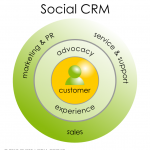 With an ever increasing number of customers engaging with companies via social media, building this social data into your customer relationship management systems is crucial. Companies need to know when a customer asks, and indeed solves, a problem on a customer community or external social network. They need to know which is the preferred communications method for a particular customer and whether they’re a particular brand advocate.
With an ever increasing number of customers engaging with companies via social media, building this social data into your customer relationship management systems is crucial. Companies need to know when a customer asks, and indeed solves, a problem on a customer community or external social network. They need to know which is the preferred communications method for a particular customer and whether they’re a particular brand advocate.
Building this into your CRM system is far from easy however. A lot of data from social communities can be siloed and difficult to plug into existing CRM solutions. Oracle are making ever larger steps into the social business field, and they’ve teamed up with Eloqua to produce a white paper on social CRM. The document outlines five steps that can help you get started.
- Involve your customers – The first step they claim is to fully understand what success looks like for your customer. What do they want to get from correspondence with you? This sounds like a simple first step, but when each customer wants/demands unique treatment it is really anything but.
- Develop a customer focused strategy – Once you know what customers want, Oracle suggest devising a strategy to achieve that. Again, it’s difficult to have a clear end point in mind at this stage without generalising about what that is, which can often result in communicating to customers en masse rather than individually.
- Put programs in place – Your social CRM should map to overall organisational goals. From here you can flesh out your strategy with clear proposals that have measurable outcomes.
- Assess your processes – When you look at your processes through the eyes of your customers you can begin to streamline them based on what matters to your customers.
- Find the tools – Whilst any social business project will be fundamentally about the culture of your organisation, it will nonetheless be important to have the right tools to support you.
- Foster cultural change – Oracle suggest that in a social CRM world, it’s the customer that controls the conversation, not the seller, and that only those organisations that understand this can succeed in social CRM. I’d go as far as suggesting this should be the very first step, because changing the culture is a huge job, and the wrong culture can so easily sink any social endeavours you may have. Get this right before you start however and it becomes much, much easier.
The paper then goes on to outline the five key things they believe you need to learn about each customer.
- Who are your different customer segments?
- Which communication channels do your customers prefer?
- What do they want to communicate with you about on each channel?
- What will it cost to communicate with customers on the appropriate channels?
- How do you prioritize investments in each channel?
Overall it presents an interesting introduction to the topic if it’s a new one to you. Make no mistake though, if you are to implement a social CRM project, it is a massive undertaking and one that shouldn’t be taken lightly. Whilst the rewards for successful implementation are considerable, the road is littered with failed initiatives.
Whilst the Oracle document does rightly touch on culture, I think if anything it undersells just how important it is to the success of any social related endeavour. You can download the white paper here so have a look and see what you think.
There's a nice presentation by Maddie Grant on this topic here http://www.slideshare.net/maddiegrant/social-crm-…